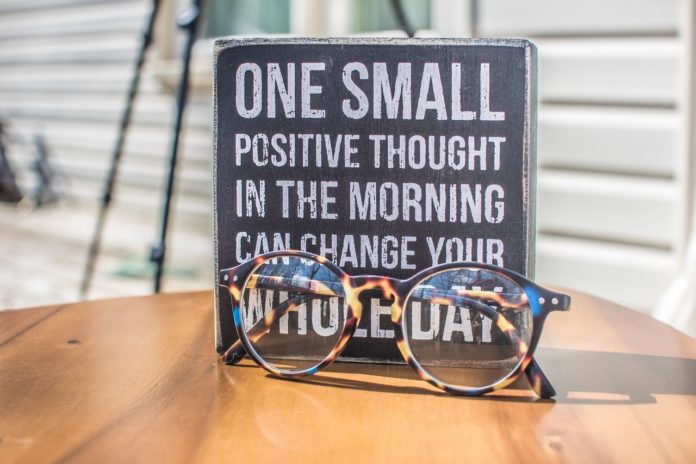You’re probably tired of reading another positivity article since you’ve likely encountered them frequently. So why are we still regurgitating positivity?
It is simply because the power of positivity cannot be over exaggerated.
You see, people usually fall into one of three categories: positively minded, negatively minded, and realistically minded, although things in reality are rarely so clear-cut. The truth is that it is all situational, and a person who is having negative thoughts at one moment can be smiling the next.
For example, you are feeling depressed because you weren’t selected for a position you applied for, but the phone suddenly rings, and someone says that you’ve been wrongly informed.
Positive reasoning doesn’t mean that you keep your head in the sand and disregard life’s less “charming” circumstances. It rather implies that you approach adversity with the mentality of seeing the glass half full instead of half empty. You think the favorable will occur, not the most terrible. In other words, you choose to see that life is happening for you rather than to you, even if you’re experiencing considerable discomfort.
Check out this article that we’ve written explaining why hardships are a necessary part of life.
Why You Should Think Positively

Reasoning often begins with self-talk i.e. the unending stream of implicit musings that crosses your mind every day. These programmed contemplation can be positive, neutral, or negative. A portion of your self-talk will typically come from rationale and reason, with the rest from misguided judgments that you make due to absence of data or your wrong perception.
Do not confuse positivity with sunshine and rainbows, even though the two sound similar. Having the courage to acknowledge challenges while still maintaining a positive mindset is a skill that many people can greatly benefit from. And no, it’s not easy, but that’s paradoxically what creates meaning in life.
1. Positivity Attracts
People have a tendency to get attracted to those who are upbeat and avoid those who are downbeat. This is because positivity is contagious (and we mean this in a good way) while negativity repels. Can you imagine how it’d feel to be surrounded by people with negative thoughts all day long? We’d surmise that you’d be pretty miserable as well.
Having a positive outlook can attract all sorts of things your way, like romance, luck, and even money. This isn’t “the secret” but a simple basic truth that is shared across people of all ages and cultures. A positive mindset will make your journey towards your goals a little easier and less frustrating.
2. Confidence
It is easy to tell a person’s level of confidence by the way in which they physically present themselves. No, we don’t mean how nice or clean the clothes they’re wearing look although these can be important too. What we mean is their physical posture, tone of voice, and general demeanor.
Confidence and positivity go hand-in-hand and are self-reinforcing. We are not saying that you will not feel down some of the time because you surely will. What you need to ensure is that you are feeling confident, even if only relatively, about yourself if you wish to open up a world of possibilities and especially in times of difficulties. Confident people know that they can approach things with a learning mindset even if they are already experts in that particular field.
3. Better Overall Well-being
Positivity has been linked to better mental and physical health. It also has a cascading effect which is why starting your day off with a positive mindset is so important, more so if you’re feeling down.
The good news is you can cultivate positivity on your own or with someone else. Start with something simple like simple breathing exercises, a short 10-minute yoga session, or expressing gratitude for everything that you have. All these will help you to start your day right, and sometimes this is all that matters.
How to Be Positive

1. Surround Yourself with Positive Individuals (and Objects)
It is said that you are the sum of the five people whom you spend the most time with. We are unsure if five is the exact number, but the underlying message is undeniable: whom you spend time with influences your thinking and behavior. For example, people living in countries that promote individualism are more likely to be individualistic and vice versa.
This even extends to objects and their placements which many cultures believe will bring about protection or good luck. It, therefore, pays to be selective about who and what you spend the majority of your time with because their influences can be significant.
Other ways to cultivate a positive mindset include listening to music, reading, and mindful breathing.
2. Nobody Owes You Anything
One of the worst enemies of living a meaningful life is to carry around the belief that others owe you something. This mindset is not only demotivating but potentially debilitating as well since you are less likely to want to put in the necessary effort to create your future.
Nobody owes you anything. Life is not reasonable. Accepting anything else sets you up in an endless loop of finding fault, victimhood, and outrage. It can also take a major toll on your well-being.
The solution?
Go out and earn your keep. This is not only more rewarding but can also give meaning to your life. After all, meaning is what ultimately matters in the short period of time you have in this world.
3. Quit Complaining
When was the last time complaining actually solved your problems? We’re not saying that complaining never works, but most things will not miraculously fix themselves just because you whined and complained.
The best course of action is action itself (or inaction as the case may be). Try to imagine yourself living in a utopia and see how long you’d last. Life is a great paradox. We hate problems, yet overcoming problems is how we find meaning.
4. Have a Learning Mindset
Think of your brain as your personal operating system. Someone who is closed to learning new things will have an operating system that is fixated, stale, and self-limiting. You will also be wasting away your brain’s plasticity, leaving it to rot similar to a machine that goes unused.
This applies even if you possess a higher education degree because learning isn’t confined within the walls of teaching institutions. Curiosity knows no bounds if you are willing to set aside your preconceived notions and allow yourself to explore. It is, after all, how we humans have progressed to be where we are today.




